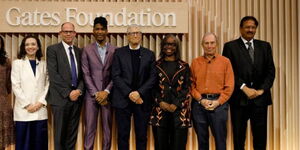Agriculture Cabinet Secretary Mutahi Kagwe has revealed that the government will launch the Good Quality Milk certification programme, which will affect how dairy farmers are paid.
Kagwe claimed that after the programme, which aims to enhance the hygiene and safety of milk in the country, has been rolled out, farmers who supply high-quality milk will be rewarded with premium payments compared to those who supply substandard milk.
The agriculture boss said this during the official opening of the 17th African Dairy Conference and Exhibition (AFDA17) at the Kenyatta International Convention Centre on Tuesday, September 30.
“We must all produce good quality milk, and the farmer must be recognised for doing the right thing. It cannot be the same amount for bad and good. Those who produce better will earn better,” the CS said.
According to Kagwe, aflatoxin-contaminated animal feeds, especially maize feeds, are the key reason contributing to substandard milk in the market. Kagwe claims that toxins in maize feeds pass directly into the milk, thus making the milk unfit for consumption.
In order to prevent this, the CS said that feed manufacturers and farmers should adopt safe products to suppress aflatoxin in maize, which will, in turn, expand the country's dairy product market, especially in the export sector.
“No export without quality. Aflatoxin in maize feeds passes straight into milk and locks us out of lucrative markets. If we are serious about doubling production and exporting, we must fix feed quality first,” Kagwe stated.
"Use aflatoxin-free maize. Adopt Aflasafe. This is the only way to guarantee the best milk for Kenyans and protect our place in global markets,” he added.
Farmers and other agricultural stakeholders across the continent should ensure that they benchmark, share, and adopt practices that will enhance standards in dairy farming, according to Kagwe.
In a statement on Thursday, July 24, the CS revealed that the government is in the process of leasing out land to large-scale farmers who are interested in engaging in dairy feed production.
According to Kagwe, the government will target farmers willing to grow fodder and sunflowers, which are among the critical ingredients for sustainable dairy farming, in the leasing programme.
The move is among the key initiatives being implemented to address inadequate livestock feed, post-harvest losses, and climate change-related issues, which have long plagued dairy farming in the country, according to the CS.
"We must adopt practical and viable interventions to transform the dairy sector. We must synergise our efforts to increase production and productivity through the commercialisation of pasture and fodder production," Kagwe said.












